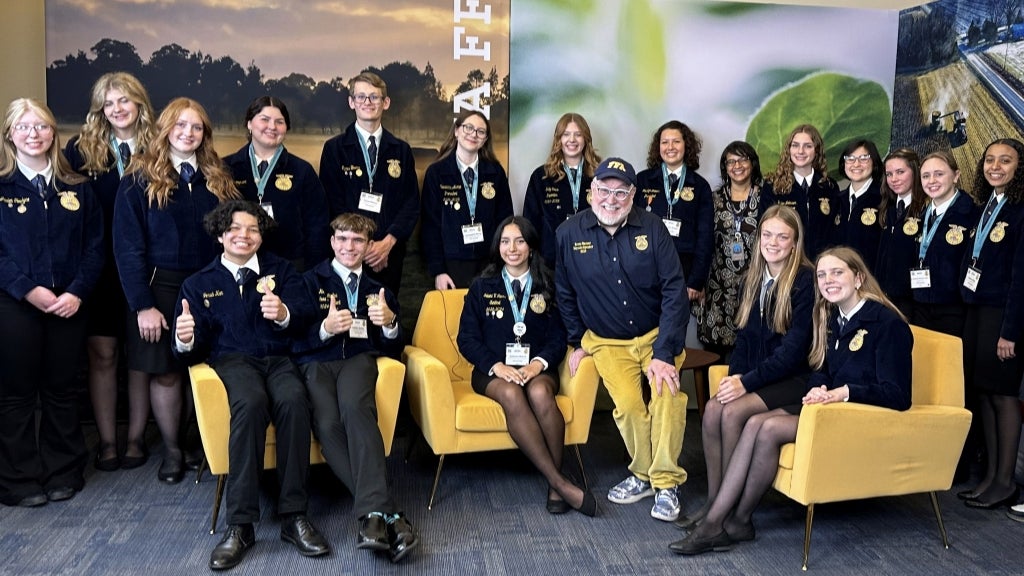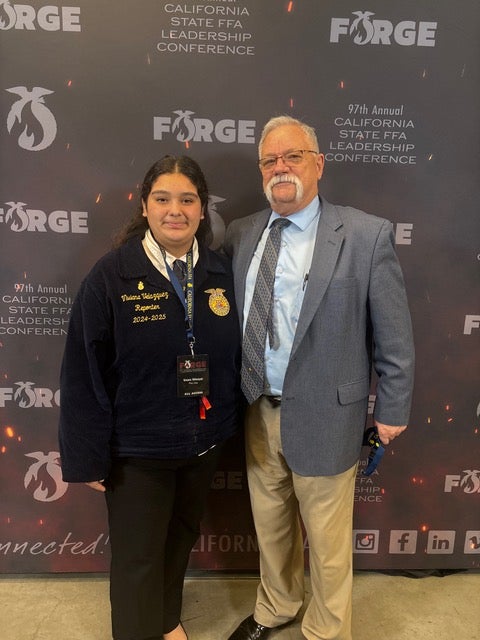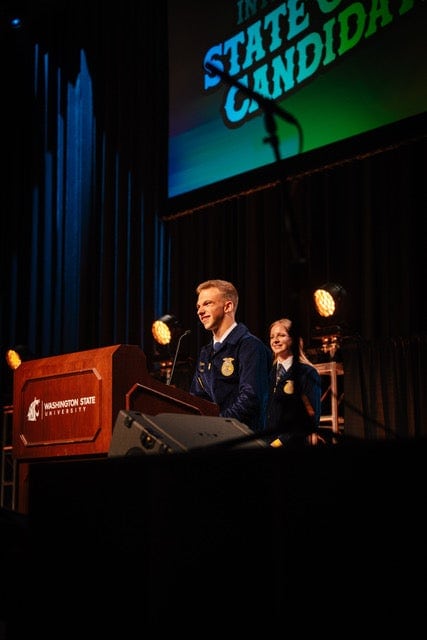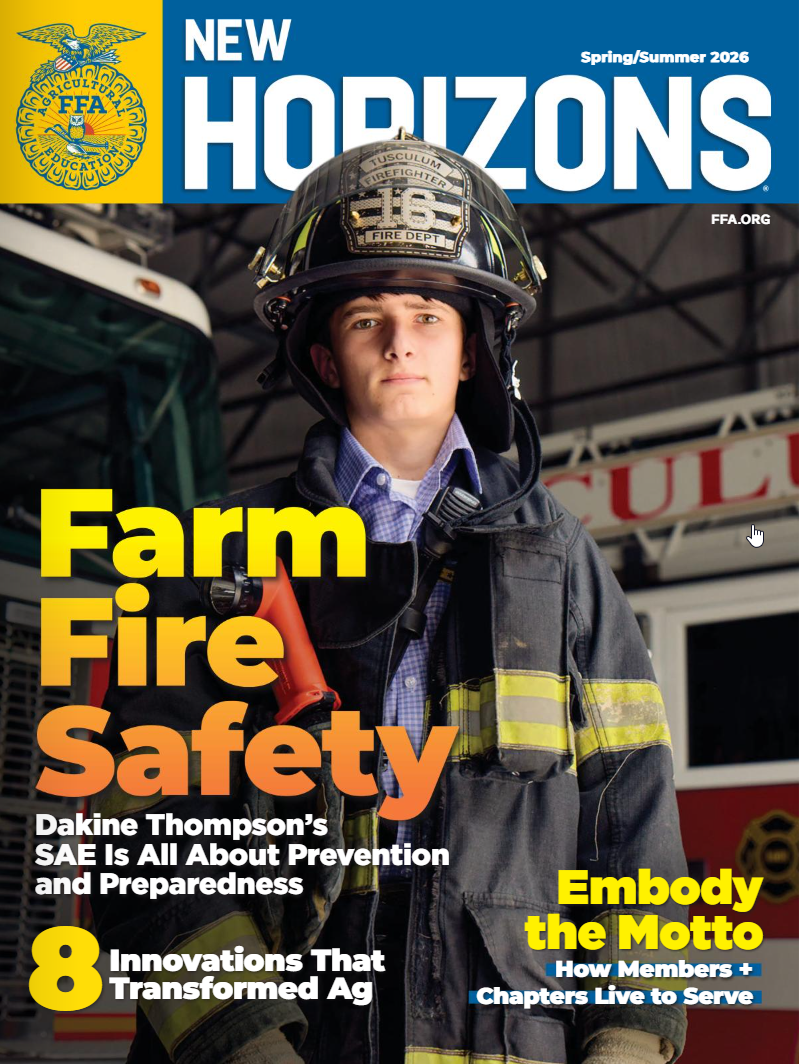7 Ways I Grew as a Storyteller

Members of the 2024-25 FFA in the USA reporters cohort tour the FFA Live! studio during the 97th National FFA Convention & Expo.
Ever dreamed of becoming a journalist or working in the communications, marketing or public relations fields? If so, we’ve got some news for you.
In 2024, the National FFA Organization launched its FFA in the USA reporters program. Throughout the program’s first year, more than 130 reporters from across the United States and Puerto Rico sharpened their skills by contributing monthly articles, videos, photo slideshows and more to FFA.org. We chatted with two 2024-25 reporters, Viviana Velazquez and Trent Oney, about what it meant to become part of this new program.
A rising senior at Bear River High School in California, Velazquez hopes to be the first in her family to pursue higher education. She plans to major in agricultural education with a minor in either bilingual education or journalism and communications.

Viviana Velazquez interviewed retiring California FFA state advisor Charles Parker for a story she wrote as an FFA in the USA reporter. Photo courtesy of Viviana Velazquez.
“This program truly reshaped how I see myself as a storyteller,” Velazquez says. “It introduced me to real-world interviews, gave me the basics of photography and journalism and strengthened my confidence as a communicator. It was worth every late night and early morning.”
Oney lives in the state of Washington and will be a senior at Sumner High School this fall. A first-generation agriculturist, Oney plans to run for a state FFA office next year and eventually hopes to pursue a career in public service, with an interest in public speaking and information.
“I’ve always loved to write,” Oney says. “Whether it’s a school assignment or a weekly newsletter for a club or team, I’m willing to share a story. I would 100% recommend the FFA in the USA reporters program to aspiring members. I’ve met new people not only in Washington, but from around the nation and beyond. My writing skills have advanced, and our training has given me skills needed to continue writing thorough and unique stories throughout my time in FFA.”

Trent Oney plans to apply the skills he gained as an FFA in the USA reporter to his quest of becoming a Washington FFA state officer. Photo courtesy of Trent Oney.
Read on to discover seven ways this program helped Velazquez and Oney grow as storytellers.
1. I turned my fear into fuel.
“I was nervous at first, especially about interviewing people or networking, but I was honest about that fear,” Velazquez says. “That honesty opened doors to mentorship and meaningful connections, such as serving as part of the California State Leadership Conference press corps. One of my proudest moments was writing the retiring address for the California FFA state advisor.”
2. I sharpened my editorial eye.
“The program helped me improve my writing clarity and voice,” Velazquez says. “I learned to self-edit more effectively, seek peer feedback and think more critically about how to structure stories that connect with readers.”
3. I adapted to different audiences and formats.
“I tailored my writing for various platforms, whether it was a social media post, a formal article or a quick recap for a newsletter,” Velazquez says. “Understanding the tone, length and purpose for each piece made me a more versatile communicator.”
4. I made others feel like their story matters.
“Through this program, I related to members from around the state of Washington and shared their stories,” Oney says. “Whether it was a unique Supervised Agricultural Experience or a fun chapter event, I learned how each story affected every member, and it gave them a voice in an organization so large.”
5. I told stories with purpose, not perfection.
“Stories have to be authentic,” Velazquez says. “Some of the best writing I produced wasn’t polished at first, but it had heart. Learning to write with intention, empathy and inclusivity made me realize storytelling isn’t about spotlighting yourself, but giving others a voice.”
6. I gained a deeper understanding of each FFA member’s unique journey.
“Through conversations, experiences and stories, I connected with members who bring diverse perspectives and backgrounds, each offering a different outlook on the world,” Oney says. “This taught me about our differences – how we think, work, study and function. I learned these are not obstacles, but strengths. Being a reporter gave me the opportunity to listen, learn and appreciate others’ stories and viewpoints.”
7. I learned to work as part of a team.
“We bounced ideas off one another throughout the year,” Oney says. “We had an Instagram chat where we communicated concerns, questions or knowledge about different topics. When a reporter was struggling, we were all there for each other. It was like a small community within a big world, and I was honored to be a piece of the puzzle.”
Hone Your Craft
One of the best ways to grow is by surrounding yourself with talented, passionate people. Read more FFA in the USA content, then consider applying for this hands-on program in the future.


